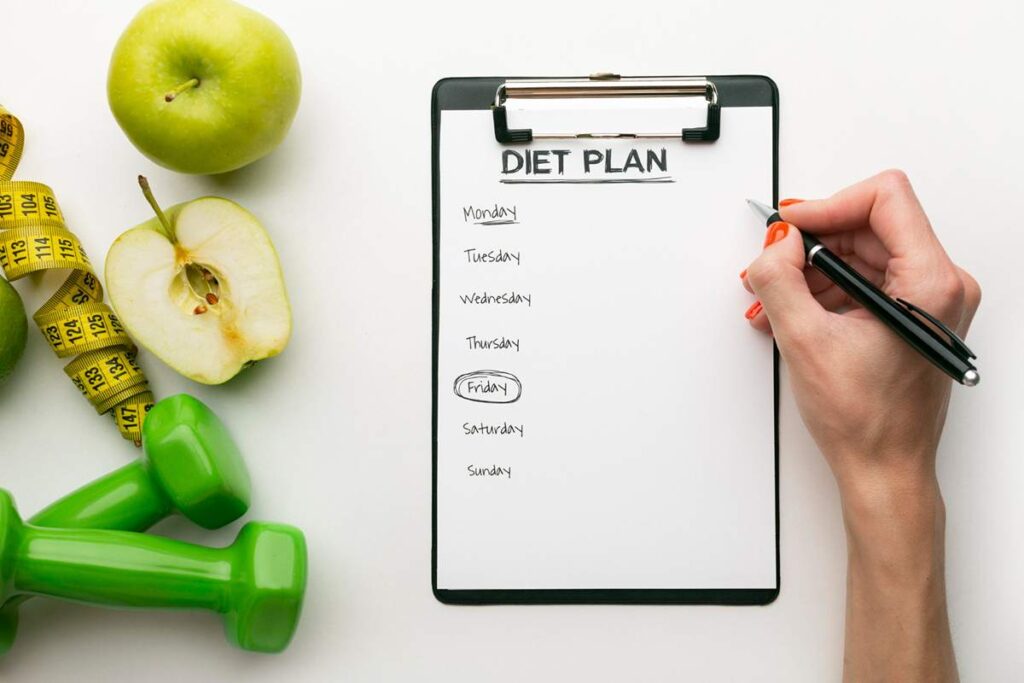A calorie deficit means eating fewer calories than your body burns, usually for fat loss. But can you still build muscle in this state? Yes, it’s possible, but only if you follow the right approach. Key factors like high-protein nutrition, strength training, and proper recovery play a crucial role. Beginners, overweight individuals, and those on a well-planned diet can gain muscle while losing fat. However, extreme calorie cuts can lead to muscle loss instead. By lifting weights, eating enough protein, and prioritizing recovery, you can successfully build muscle even in a calorie deficit.
What is a Calorie Deficit?
A calorie deficit happens when you consume fewer calories than your body burns. This forces your body to use stored fat for energy, leading to weight loss. People enter a calorie deficit for various reasons, such as fat loss, cutting phase (for athletes), or body recomposition. While it helps reduce fat, it can also impact muscle growth if not managed correctly.
How Does the Body Build Muscle?
Muscle growth occurs through progressive overload—challenging muscles with heavier weights or more reps over time. This stimulates protein synthesis, where the body repairs and builds stronger muscle fibers. Calories fuel workouts, protein repairs muscles, and resistance training triggers growth. Even in a deficit, muscle gain is possible with proper strength training, high protein intake, and adequate recovery.
Can You Build Muscle in a Calorie Deficit?
Yes, building muscle in a calorie deficit is possible, but it depends on several factors. While calories are needed for energy, muscle growth relies more on protein intake, strength training, and recovery.
Conditions Where It’s Possible
- Beginners (Newbie Gains) – If you’re new to weight training, your body adapts quickly, building muscle even in a deficit.
- Overweight Individuals (Body Recomposition) – Those with higher body fat can lose fat and gain muscle at the same time.
- High-Protein Diet + Strength Training – Eating enough protein (1.6–2.2g per kg) and lifting weights helps preserve and build muscle.
When Muscle Gain in a Deficit is Difficult
- Advanced Lifters – Experienced athletes need a calorie surplus to see significant muscle growth.
- Extreme Calorie Deficits – Cutting calories too much leads to muscle loss, fatigue, and poor recovery.
- Lack of Strength Training & Protein – Without resistance training and proper nutrition, the body loses muscle instead of fat.
Key Factors to Build Muscle in a Calorie Deficit

Building muscle while in a calorie deficit requires strategic nutrition, strength training, and proper recovery. Here’s how to maximize muscle growth even when eating fewer calories.
Protein Intake: The Most Important Factor
Protein is the building block of muscles, helping with repair and growth after workouts. Without enough protein, the body breaks down muscle for energy instead of preserving it.
- How much protein do you need? Aim for 1.6–2.2g per kg of body weight to maintain and build muscle.
- Best protein sources:
- Animal-based: Chicken, fish, eggs, Greek yogurt, lean beef
- Plant-based: Lentils, beans, tofu, quinoa, nuts
- Animal-based: Chicken, fish, eggs, Greek yogurt, lean beef
Strength Training and Progressive Overload
Lifting weights signals the body to hold onto muscle in a deficit. The key is progressive overload—gradually increasing weights, reps, or intensity over time.
- Why strength training is essential: Without it, the body burns muscle instead of fat.
- Best exercises for maximum muscle gain:
- Squats (legs, glutes, core)
- Deadlifts (full body, posterior chain)
- Bench press (chest, shoulders, triceps)
- Pull-ups & Rows (back, biceps)
- Squats (legs, glutes, core)
Managing Recovery and Sleep
Recovery is just as important as training. Without proper rest, muscle repair slows down, increasing the risk of loss instead of growth.
- Why sleep matters: During deep sleep, the body releases testosterone and growth hormone, crucial for muscle recovery.
- How much sleep is needed? Aim for 7–9 hours per night for optimal muscle retention.
Smart Calorie and Macronutrient Distribution
It’s not just about eating fewer calories—it’s about eating the right foods in the right balance.
- Best macronutrient ratio:
- High protein (to build and preserve muscle)
- Moderate carbs (to fuel workouts and recovery)
- Healthy fats (to support hormones and overall health)
- High protein (to build and preserve muscle)
- Why nutrient-dense foods matter: Instead of focusing only on calories, eat whole foods rich in vitamins and minerals to support performance and recovery.
Common Mistakes People Make
Many people struggle to build muscle in a calorie deficit because of common mistakes that slow progress. Avoid these errors to maximize muscle retention and growth.
Cutting Calories Too Much
Some people drastically reduce calories, thinking it will speed up fat loss. However, extreme calorie deficits can:
- Cause muscle loss instead of muscle gain
- Lead to fatigue and lower workout performance
- Slow down recovery, making strength training less effective
Fix: Maintain a moderate deficit (300–500 calories) to lose fat while preserving muscle.
Not Eating Enough Protein
Focusing only on calorie restriction without ensuring enough protein intake is a big mistake. Without enough protein, the body:
- Breaks down muscle tissue for energy
- Struggles to repair and grow muscles
- Experiences slower recovery and poor strength gains
Fix: Consume 1.6–2.2g of protein per kg of body weight daily from lean meats, dairy, eggs, and plant-based sources.
Lack of Strength Training
Many people rely only on cardio for fat loss, but this can lead to muscle loss instead of muscle gain. Without resistance training, the body:
- Burns muscle along with fat
- Doesn’t get the stimulus needed for muscle growth
- Becomes weaker over time
Fix: Prioritize strength training at least 3–4 times a week, focusing on compound exercises like squats, deadlifts, and presses to build and maintain muscle.
Diet and Workout Plan for Muscle Growth in a Calorie Deficit

To build muscle while in a calorie deficit, you need a well-balanced diet and a structured strength training routine. Here’s an optimized meal and workout plan to help you reach your goals.
Sample Meal Plan
A high-protein, nutrient-dense diet ensures your body gets enough fuel for muscle repair and growth.
Breakfast – Oatmeal with protein powder (slow-digesting carbs + muscle-repairing protein)
Lunch – Grilled chicken with quinoa and vegetables (lean protein + complex carbs + fiber)
Dinner – Salmon with sweet potatoes and salad (healthy fats + muscle-supporting nutrients)
Snacks – Greek yogurt, nuts, protein shake (protein-packed snacks for muscle retention)
Workout Plan
To build muscle efficiently, aim for 4–5 strength training sessions per week, focusing on compound exercises that target multiple muscle groups.
Example Weekly Split:
- Day 1: Upper Body (Bench press, rows, shoulder press)
- Day 2: Lower Body (Squats, lunges, deadlifts)
- Day 3: Rest / Active Recovery (Walking, stretching, mobility work)
- Day 4: Full Body (Pull-ups, dips, leg press)
- Day 5: Core & Cardio (Planks, HIIT, ab exercises)
Can you be on a calorie deficit and gain muscle?
Yes, but it requires high protein intake, strength training, and proper recovery. Beginners and overweight individuals see the best results.
Is a 500-calorie deficit too much to build muscle?
A 500-calorie deficit is manageable if you eat enough protein and lift weights, but too large a deficit may lead to muscle loss over time.
Can I still build muscle with 1500 calories?
It depends on your body size and activity level. If you get enough protein and train effectively, you may build muscle, but it’s harder for advanced lifters.
Can you build muscle in a 400-calorie deficit?
Yes, a moderate deficit (200–500 calories) can support fat loss and muscle growth, especially for beginners or overweight individuals.
Will I lose muscle if I eat in a calorie deficit?
If you don’t eat enough protein or skip strength training, you may lose muscle. A proper workout and nutrition plan help maintain muscle.
Is 2500 calories enough to build muscle?
For some people, yes! 2500 calories can be a deficit, maintenance, or surplus, depending on body size and activity level.
Can I build muscle in a deficit without protein shakes?
Yes! Whole foods like chicken, fish, eggs, beans, and dairy provide enough protein without needing shakes.
How fast can I build muscle in a deficit?
Muscle growth in a deficit is slower than in a surplus. Expect small but steady gains over weeks to months with the right approach.
Should I lift heavy weights or do more reps?
Both can work, but lifting moderate to heavy weights (6–12 reps) is best for muscle growth in a deficit.
Can women build muscle in a calorie deficit?
Absolutely! Women can gain muscle while losing fat by eating enough protein and following a structured strength training program.
Conclusion
You can build muscle in a calorie deficit, but it requires the right balance of nutrition, strength training, and recovery. The key is to eat a high-protein diet (1.6–2.2g per kg of body weight) to support muscle repair while engaging in progressive overload through strength training. Avoiding extreme calorie deficits is crucial, as cutting too many calories can lead to muscle loss instead of growth. Additionally, proper sleep and recovery (at least 7–9 hours per night) play a vital role in muscle preservation by regulating hormones like testosterone and growth hormone. Staying consistent, tracking progress, and making necessary adjustments will help you build muscle while losing fat efficiently.














